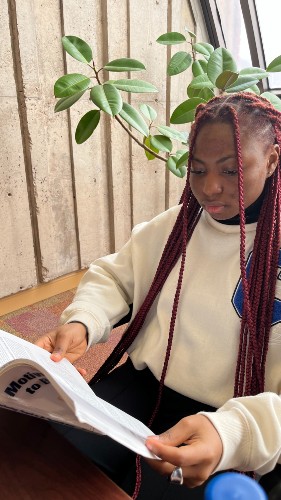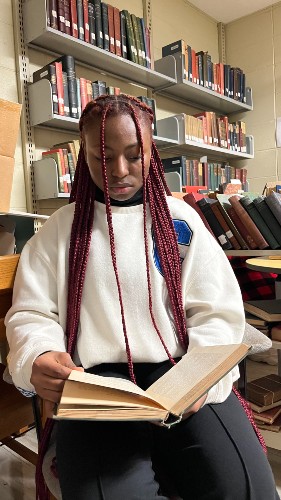interviewed and written by Shura Hanna
The act of sacrifice is never committed in vain—it is the intentional endurance of hardships in pursuit of a greater goal. While the severity of sacrifice required to succeed varies depending on the goal, there is a collective understanding amongst those who have been there. In my experience, the immigrant student who migrates to Canada on their own, while forging the brink of adulthood, has a considerable story of sacrifice.
When I migrated to Canada a winter ago, I had only an idealized version of what my college experience would be. Much of what I expected was an easy journey that included making lots of friends, attending events, and passing through my courses with minimal difficulty. It comes as no surprise that what a lot of incoming traditional students (i.e., those matriculating directly out of high school) expect of their college experience comes from the media. The college years are often portrayed as a time of getting to know oneself through a series of new adventures. While I anticipated some of the obstacles that I’d face, I didn’t quite understand the extent in which my perseverance would be tested. Whether it be in relation to financial struggles, personal difficulties or academic troubles, there was always a facet in life where obstacles could arise.
While I could recount a variety of experiences that made me question whether I’d made the right decision in coming to Canada, my story was far from unique. It was another piece of a puzzle that portrayed a bigger picture.
In pursuit of learning more about the shared commonalities of the international student experience, I came across a student who I’d met early in my second year. Christy Oditah is a Nigerian student who migrated to Canada in the Fall semester of 2022. She was born in Delta State, Nigeria as the eldest daughter in a family of five. She lived there for twelve years then moved to the capital of Abuja for four years before moving to Canada. 
“Moving here was never a part of my plan.” Christy commented, describing how she had initially planned to stay in Nigeria and attend a local university. She took a few exams in preparation for her travels and spoke with her parents who were surprisingly open to the idea of her moving abroad.
“They never stopped me. I guess they saw the opportunities that would come from me moving to Canada and decided it would be worth the journey,” she said.
Christy has shown a commendable level of bravery since she took a leap of faith in September 2022. She could be described as an introverted, amiable girl with a calm persona; however, the first day I met Christy, she was rightfully distraught and out of her element. “I need help,” she admitted, visibly concerned.
I’d taken on the role of being a Residence Life Advisor at the university in my second year and was pacing about helping new students move in. It was a long day, filled with tears from parents and the heavy lifting of numerous items. I’d passed Christy, who was huddled into a corner with her suitcases firmly grasped, and asked if she needed assistance about three times before she accepted my offer for help.
“I’m trying to contact my family because [the university is] saying I don’t have a room here.”
I chatted with her to get an understanding of what her problem was, and I was taken aback as her story unfolded. She had just arrived in Charlottetown after three days of strenuous solo travel from Nigeria. Sixteen years old at the time, she had missed two flights and had her documents initially denied before finally arriving in Charlottetown. In one suitcase was all of her clothing and personal belongings, and in the other bag was a month’s supply of food sent by her concerned parents. According to Christy, they hadn’t slept since she embarked on her journey to university.
I was inspired by the tenacity that she’d exhibited in her quest to become a student at UPEI. It was her first time ever boarding an airplane and she’d made it so far on her own. Unfortunately, this was only the beginning of another whirlwind of issues.
“Did you register for your room online?” I asked in hopes of finding a resolve for the misunderstanding that seemed to be taking place. “I had someone help me apply for university. They have all of the information,” she replied.
Within minutes of conversing, I’d come to the realization that she hadn’t been registered for classes nor was she registered for a room at the university. Much of what was supposed to be done in preparation for her journey—a responsibility undertaken by a trusted family friend who’d offered to help with the migration process—wasn’t carried out. Christy, a first-generation college student, found herself in the first of many predicaments that she’d simply have to figure out on her own. Unlike domestic students, the issues faced by international students are often met with greater anxiety due to their circumstances. There is no other family that Christy could reach out to within the country. In addition to moving to a foreign country with new customs and traditions, she was also now tasked with forming her own community that she could rely on in times of need.
We agreed that the need for community and external support was very underestimated by us and our peers. In instances where we would need to simply borrow a pen or painstakingly express our grievances, having people who we could relate to and be dependent on in a time of need was crucial. Luckily, her initial troubles of class registration and room assignment were resolved within two days. Much like other first generation immigrant college students (who also lacked guidance in navigating the college experience), she would also find herself getting acclimated with Canadian cultural norms.
“I feel recharged around my friends. There is no feeling of being out of place. We all understand what we’re going through and the support we give each other is really important,” she said.
Christy discussed the feeling of being more readily accepted amongst other students from the African diaspora. They understood that the process of assimilation was not only beneficial socially but professionally. There were many benefits to be derived from adopting the social cues, fashion, and norms embedded in Canadian society. While the efforts made by Canadian society at large to foster an inclusive, equitable environment for all are commendable, there is undoubtedly still work that must be done. The feeling of being generally ‘out of place’ lingers for quite a while and can be very mentally taxing, whereas the solace found in the embrace of a community that mimics the one that raised you can be described as a safe haven. It makes a difference when a person doesn’t feel compelled to perform and can just exist.
We realized that the sudden independence that comes with moving abroad is hard to get used to and often overlooked. There was no ‘seamless’ transition that allowed Christy to go from a reserved environment to full on independence. And while that shift can be freeing, it can also be quite scary.
“It’s a lot to get used to. One day you’re living with your parents in the comfort of your home country, then you have to learn how to get used to handling all of this responsibility. I had to learn how to manage my money, time and other responsibilities,” she noted.
The international student experience is one that is as jarring as it is compelling, navigating the transition into adulthood without the hands-on approach from those who’ve been guiding you your entire life. Christy mentioned the immense pressure she felt when considering how much effort went into her moving to Canada. Her study permit was initially denied. It was a heart-crushing experience, but with a persevering spirit she applied again and waited months for her papers to return. Her passport wait added to the anticipation. She also considers the hefty cost of tuition placed on international students.
 She brought up a number of points that were important to recognize. As an international student, she was hopeful that she would graduate on time, because if she doesn’t, she’s at risk of being in the country on an expired study permit. She works extra hard because failing courses means she would pay a considerable amount in international student fees yet again to stay extra semesters. She feels the pressure of trying to make herself as marketable and optimizable as possible to future employers in hopes of obtaining a post-grad work permit. Carrying the weight of your families’ hopes, dreams, and sacrifices can never be considered a light load in any capacity.
She brought up a number of points that were important to recognize. As an international student, she was hopeful that she would graduate on time, because if she doesn’t, she’s at risk of being in the country on an expired study permit. She works extra hard because failing courses means she would pay a considerable amount in international student fees yet again to stay extra semesters. She feels the pressure of trying to make herself as marketable and optimizable as possible to future employers in hopes of obtaining a post-grad work permit. Carrying the weight of your families’ hopes, dreams, and sacrifices can never be considered a light load in any capacity.
After getting her first job and having to take a gap semester, Christy began to understand the implications of adulthood. She had relentlessly put effort into applying for jobs and trying to manage her tuition to help her parents.
“It’s taught me a new level of responsibility. I’ve learned a lot from my experiences here. One of the most important things I’ve learned, and I prioritize now, is personal growth. There was a time when I was afraid of what the future would bring because there was uncertainty financially. But I’ve now learned everything happens for a reason.”
Getting a job has given her new opportunities and added a different perspective that she is grateful to be learning from. She is proud to now be more independent and confident in her decision-making skills.
Christy now hopes to continue moving forward in her experiences and in her studies. Her small setbacks have been a launching pad into a more resilient academic career. She acknowledges that her sacrifices will ultimately be worth it.
In closing, I hope that this piece will bring light to the unique experiences of international students who pay a hefty price in pursuit of their dreams abroad. These students often leave all they’ve ever known with the mindset that chasing a brighter future will yield a greater reward than staying where they’re comfortable. The pursuit of this dream can come with considerable financial implications, mental instability, and drastic cultural shifts all while balancing the hardships of disappearing adolescence. International students must quickly adapt to their new surroundings while grappling with their incomplete, ever-evolving sense of self. This piece is an homage to the blood, sweat, and tears paid to cover the cost of a dream; it is a spotlight on the stories that often go untold in the halls of the University of Prince Edward Island.
